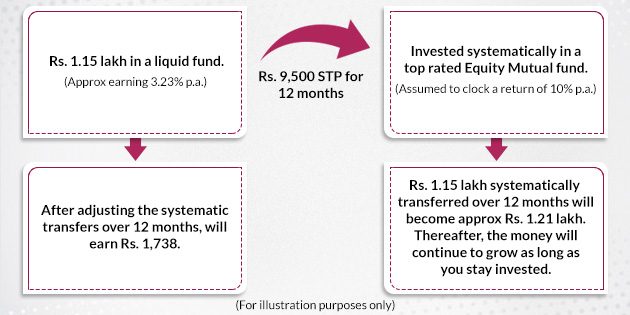6 MinsDec 1, 2021
It is customary to give money as gift on special occasions such as a festival, a birthday or weddings. Even employers reward their employees by way of bonus during festivals. If you have received any bonus or money as gift, it would be sensible
to invest the same in wealth-creating investment avenues such as mutual funds to brighten your financial future.

Tips to keep mind when investing in mutual funds:
- Assess your risk profile, investment objectives, financial goals, and the time in hand to achieve those goals before you select the mutual fund schemes.
- The key is to optimise your risk returns, so select funds very thoughtfully.
- Holistically evaluate mutual fund schemes on a host of quantitative parameters (viz. returns across time frame, returns across market cycles, risk ratios, the expense ratio, portfolio construct, portfolio turnover, etc.) and qualitative parameters
(viz. portfolio characteristics, the credential of the fund management team, the overall efficiency of the mutual fund house in managing investors’ hard-earned money, i.e. the proportion of AUM actually performing, and other aspects).
- Select funds with an appealing and consistent long-term performance track record by comparing them to their category peers and benchmark index.
- Also, they should be from fund houses that follow robust investment processes and systems.
- Assuming you want to address a long-term financial goal (which is more than 3 years away), consider investing in one of the equity-oriented mutual funds with sustainable history of performance. Given the volatility in the market and the fact
that Indian equity markets are near an all-time high, an alternate strategy could be to invest in a staggered manner. You can invest the lump sum either into a Liquid Fund or keep it in the savings bank account and then systematically transfer the same into Equity-oriented mutual funds (that suits your risk profile) vide the Systematic Transfer Plan (STP) or systematic investment plan (STP).
For example, say the total amount to be invested is Rs 1.15 lakh (Diwali Bonus: Rs 1 lakh + Cash received: Rs 15,000).
[Also Read: Know How Much it Costs to Invest in Mutual Funds]
Here’s the investment strategy to follow – Invest the amount in a Liquid Fund/Bank account earning around 3% (category average returns of Liquid Funds at the current juncture). Then transfer around Rs 9,500 every month
into an equity-oriented fund via STP or SIP over the next 12 months. The money-flows to the respective funds will be as under:

Assuming the equity-oriented fund generates @10% p.a., the Rs 1.15 lakh that you deployed could grow to approximately Rs 1.21 lakh at the end of the 12-month STP/SIP tenure and the money in equities thereafter would continue to grow for as long
as you stay invested.
Structure your equity portfolio smartly
- When doing systematic transfers to an equity-oriented mutual funds, consider following the Core & Satellite approach. In your Core holdings include a Large-cap Fund, a Multi-cap or a Flexi-cap Fund, or a Value Fund. Whereas for the Satellite
portion, you may include a Mid-cap Fund or a Small-cap Fund, aligning it with your risk tolerance on these funds, as these funds are rated high on risk parameters.
- Structuring your portfolio sensibly will help diversify the portfolio, add stability, and would help to push up the overall returns.
- But keep an investment horizon of 5-7 years when you invest in these funds.
Choose debt funds for short-term goals
- If your time horizon is less than three years, select debt mutual funds with maturity matching your holding period, having exposure to high quality underlying instruments.
- If your time horizon is 6 to 12 months, consider Ultra-short Duration or Low Duration Funds or Money Market funds.
- If your time horizon is 3 to 6 months, select Liquid Funds with high-quality debt papers.
Avoid those debt mutual fund schemes that have relatively high exposure to low-rated (below AA- rates) securities.
Complete your tax-saving investments for the year
You may consider investing your bonus in an Equity Linked Savings Scheme (ELSS), which is a tax-saving mutual fund. It entitles you to a deduction of up to Rs 1.5 lakh under Section 80C. This way you can meet your tax-saving requirement for the
year without waiting till the last minute. In addition to tax-saving, the 3-year lock-in period of ELSS is useful in building long-term wealth.
Pick and invest in mutual funds matching your needs!
A sensible and astute approach when handling money will pave the path to wealth creation and is always beneficial for your financial future.
Disclaimer: This article is for information purpose only. The views expressed in this article are personal and do not necessarily constitute the views of Axis Bank Ltd. and its employees. Axis Bank Ltd. and/or the author shall not be responsible for any direct / indirect loss or liability incurred by the reader for taking any financial decisions based on the contents and information. Please consult your financial advisor before making any financial decision
Mutual Fund investments are subject to market risk, read all scheme related documents carefully. Axis Bank Ltd is acting as an AMFI registered MF Distributor (ARN code: ARN-0019). Purchase of Mutual Funds by Axis Bank’s customer is purely voluntary and not linked to availment of any other facility from the Bank. *T&C apply
















